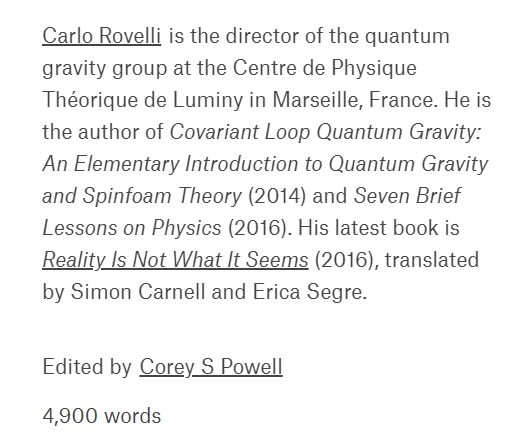This granular life

That the world is not solid but made up of tiny particles is a very ancient insight. Is it humanity’s greatest idea?
https://aeon.co/essays/is-atomic-theory-the-most-important-idea-in-human-history


According to tradition, in the year 450 BCE, a man embarked on a 400-mile sea voyage from Miletus in Anatolia to Abdera in Thrace, fleeing a prosperous Greek city that was suddenly caught up in political turmoil. It was to be a crucial journey for the history of knowledge. The traveller’s name was Leucippus; little is known about his life, but his intellectual spirit proved indelible. He wrote the book The Great Cosmology, in which he advanced new ideas about the transient and permanent aspects of the world. On his arrival in Abdera, Leucippus founded a scientific and philosophical school, to which he soon affiliated a young disciple, Democritus, who cast a long shadow over the thought of all subsequent times. Together, these two thinkers have built the majestic cathedral of ancient atomism. Leucippus was the teacher. Democritus, the great pupil who wrote dozens of works on every field of knowledge, was deeply venerated in antiquity, which was familiar with these works. ‘The most subtle of the Ancients,’ Seneca called him. ‘Who is there whom we can compare with him for the greatness, not merely of his genius, but also of his spirit?’ asks Cicero.
What Leucippus and Democritus had understood was that the world can be comprehended using reason. They had become convinced that the variety of natural phenomena must be attributable to something simple, and had tried to understand what this something might be. They had conceived of a kind of elementary substance from which everything was made. Anaximenes of Miletus had imagined this substance could compress and rarefy, thus transforming from one to another of the elements from which the world is constituted. It was a first germ of physics, rough and elementary, but in the right direction. An idea was needed, a great idea, a grand vision, to grasp the hidden order of the world. Leucippus and Democritus came up with this idea. The idea of Democritus’s system is extremely simple: the entire universe is made up of a boundless space in which innumerable atoms run. Space is without limits; it has neither an above nor a below; it is without a centre or a boundary. Atoms have no qualities at all, apart from their shape. They have no weight, no colour, no taste. ‘Sweetness is opinion, bitterness is opinion; heat, cold and colour are opinion: in reality only atoms, and vacuum,’ said Democritus.
Atoms are indivisible; they are the elementary grains of reality, which cannot be further subdivided, and everything is made of them. They move freely in space, colliding with one another; they hook on to and push and pull one another. Similar atoms attract one another and join. This is the weave of the world. This is reality. Everything else is nothing but a by-product – random and accidental – of this movement, and this combining of atoms. The infinite variety of the substances of which the world is made derives solely from this combining of atoms. When atoms aggregate, the only thing that matters, the only thing that exists at the elementary level, is their shape, their arrangement, and the order in which they combine. Just as by combining letters of the alphabet in different ways we can obtain comedies or tragedies, ridiculous stories or epic poems, so elementary atoms combine to produce the world in its endless variety. The metaphor is Democritus’s own.
There is no finality, no purpose, in this endless dance of atoms. We, just like the rest of the natural world, are one of the many products of this infinite dance – the product, that is, of an accidental combination. Nature continues to experiment with forms and structures; and we, like the animals, are the products of a selection that is random and accidental, over the course of aeons of time. Our life is a combination of atoms, our thoughts are made up of thin atoms, our dreams are the products of atoms; our hopes and our emotions are written in a language formed by combinations of atoms; the light that we see is composed of atoms, which bring us images. The seas are made of atoms, as are our cities, and the stars. It’s an immense vision: boundless, incredibly simple, and incredibly powerful, on which the knowledge of a civilisation would later be built. On this foundation Democritus wrote dozens of books articulating a vast system, dealing with questions of physics, philosophy, ethics, politics and cosmology. He writes on the nature of language, on religion, on the origins of human societies, and on much else besides. All these books have been lost. We know of his thought only through the quotations and references made by other ancient authors, and by their summaries of his ideas. The thought that thus emerges is a kind of intense humanism, rationalist and materialist.
snip
rubbersole
(6,744 posts)They would have to be.
(Now would be a good time to put up the scotch.)
Celerity
(43,640 posts)Daftmill Single Cask Sherry Butt
Distilled: 2011-12-23
Bottled: 2022
Alcohol content: 60.3%
Barrel number: #100

rubbersole
(6,744 posts)Is Fife the home of distilling scotch? The Swedes always seem to have their shit together.
Celerity
(43,640 posts)It is known for great gin as well.
For Fife whisky, I recco (all are new) Kingsbarns, Lindores Abbey (very new), and InchDairnie (in development, they do have a single grain Scottish rye out, named RyeLaw, which I have had at a whisky bar here in Stockholm), as well as Daftmill of course.



rubbersole
(6,744 posts)A trip to Scotland is on my bucket list. Playing golf on the 'links' courses was the dream. I'm going to add a week to that trip...just to explain to my liver what all the fuss was about.
usonian
(9,924 posts)This article was written in 2017.
Kindly note that an atom is mostly empty space between the nucleus and electrons.
Things we regard as solid are almost entirely empty space.
Since then, he wrote The Order of Time (2018)
His theories about time are fascinating.
Enjoy.